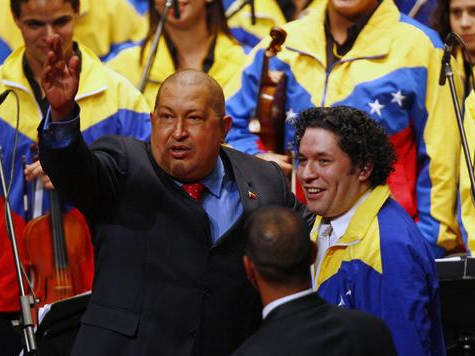A new book targets “El Sistema,” Venezuela’s famous $100 million music education program, which has been described as a “high-intensity programme of instrumental coaching that turned kids from the slums of Venezuela into the thrilling Simon Bolivar Youth Orchestra (SBYO), conducted by hot young maestro Gustavo Dudamel before he was poached by the Los Angeles Philharmonic.” The Los Angeles Times, in an effort to shield Dudamel as well as defend the program, printed a harsh response from its music critic, Mark Swed.
The book, El Sistema: Orchestrating Venezuela’s Youth, written by British musicologist Geoffrey Baker, alleges that the program’s founder, José Antonio Abreu, whom some in the media have likened to Mother Theresa, is far less than that. Baker notes that despite the worldwide fervor for The Simón Bolívar Symphony Orchestra, Sistema’s star ensemble, there have been numerous instances of sexual abuse between teachers and students, including at least one orgy at a retreat. Baker wrote of one former student, “She claimed that…young musicians regarded the trading of sexual favours as an unremarkable, even humorous, subculture within the orchestra. She mentioned so-called niños bonitos (pretty boys) appearing with brand-new, expensive instruments: ‘you think, there’s something more going on there than just talent.'” Swed only acknowledges, “That there are charges of sexual abuse, for instance, is disturbing.”
Baker also notes that the system is rigidly autocratic, and musicians who buck the system are fired. He told the Times, “Abreu is famed for his intolerance of criticism. There are many stories of people who have crossed him, and have been blacklisted and fired.” He also points out that Abreu easily worked with the Socialist dictator Hugo Chavez to pursue his own ends. As Baker wrote at his blog in 2013, “Abreu did a deal: unquestioning public support for Chávez, including the use of El Sistema’s young musicians in pro-government ceremonies, in return for unlimited government support for Abreu’s project.”
Swed dismisses such concerns thus: “Abreu is certainly not above using hocus pocus to get what he needs from the government. Moreover, he is more than willing to serve whomever is in power for what he believes to be the greater good. This involves a moral calculus more complex than Baker addresses.”
Swed, calling Baker’s book a “dangerously flawed study,” argues for a more nuanced approach: “There are systematic problems with Sistema. That has long been recognized. Some are as serious as Baker suggests. But Baker misrepresents what Sistema does, stands for, accomplishes and those in it.”
Swed counters the implicit attack on Dudamel, whom Baker has described as “a figure head for this social project,” by calling Baker’s portrayal of the conductor in the book as “more ludicrous that the parody of him in the new Amazon TV comedy series ‘Mozart in the Jungle.'” He sniffs, “Angelenos don’t need to be told about Dudamel’s capacity for artistic growth or great curiosity.”
Swed, seemingly unconcerned about the charges Baker hurls at El Sistema, concludes, “More important, Sistema’s achievement of excellence gives the country one thing it desperately needs at the moment: something to feel good about.”

COMMENTS
Please let us know if you're having issues with commenting.